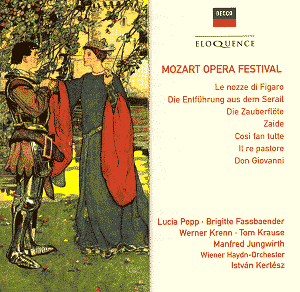|

BUY NOW
Buywell.com
|
Wolfgang
Amadeus MOZART (1756 – 1791)
A Mozart Opera Festival
Le nozze di Figaro, KV 492: 1.
Cosa sento! tosto andate (act I) – 2. Non più
andrai (act I) – 3. Voi che sapete (act II)
– 4. Crudel! perchè finora farmi languir
così? (act III) – 5. Giunse alfin il
momento ... Deh vieni, non tardar (act IV)
Die Entführung aus dem Serail,
KV 384: 6. Konstanze, dich wiederzusehen ...
O wie ängstlich, o wie feurig (act I) –
7. Vivat Bacchus! Bacchus lebe! (act II) – 8.
In Mohrenland gefangen war (act III) – 9. O,
wie will ich triumphieren (act III)
Die Zauberflöte, KV 620:
10. Der Vogelfänger bin ich ja (act I)
– 11. Dies Bildnis ist bezaubernd schön
(act I) – 12. Bei Männern, welche Liebe
fühlen
Zaide, KV 344: 13. Ruhe, sanft,
mein holdes Leben (act I)
Così fan tutte, KV 588:
14. Soave sia il vento (act I) – 15. Un’aura
amorosa (act I) – 16. Il cor vi dono (act II)
Il re pastore, KV 208: 17. L’amerò,
sarò costante (act II)
Don Giovanni, KV 527: 18. Là
ci darem la mano (act I) – 19. Finch’han dal
vino (act I)
 Lucia Popp (soprano) (1, 4, 12, 13, 14, 17,
18), Brigitte Fassbaender (mezzo-soprano) (3,
14, 16), Werner Krenn (tenor) (1, 6, 7, 8, 11,
15), Tom Krause (baritone) (1, 2, 4, 10, 12,
14, 16, 18, 19), Manfred Jungwirth (bass) (7,
9), Wiener Haydn-Orchester/István Kertész
Lucia Popp (soprano) (1, 4, 12, 13, 14, 17,
18), Brigitte Fassbaender (mezzo-soprano) (3,
14, 16), Werner Krenn (tenor) (1, 6, 7, 8, 11,
15), Tom Krause (baritone) (1, 2, 4, 10, 12,
14, 16, 18, 19), Manfred Jungwirth (bass) (7,
9), Wiener Haydn-Orchester/István Kertész
Recorded in the Sofiensaal, Vienna, October
1971
 DECCA ELOQUENCE 476 7437 [71:25]
DECCA ELOQUENCE 476 7437 [71:25]
|
Error processing SSI file
|

